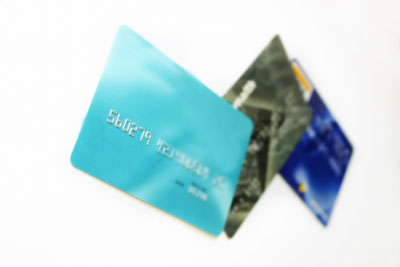Don’t read this columnby Sam Dinkin
|
| An altruist that has no use for a credit history can max out all his cards, and then declare bankruptcy. $500,000 would buy a lot of flu shots or establish an offshore prize for finding planet-killer asteroids. |
A basic unstable feedback loop as follows. Borrow on one credit card, then transfer the balance or obtain a cash advance from another to pay it off. Without any money input, successively larger balances can be transferred. As banks see a successful history of a borrower (usually) paying off their credit cards on time, they will extend more and more credit. Eventually dozens of credit cards with tens of thousands of dollars credit limit each can be obtained by the reckless borrower.
Suppose that one such individual can put together a credit limit of $500,000 in a few years. An altruist that has no use for a credit history can max out all the cards, and then declare bankruptcy. $500,000 would buy a lot of flu shots or establish an offshore prize for finding planet-killer asteroids. If only $250,000 or so is put on the credit cards, the balance can be transferred from card to card. That money can then be used to make a speculative investment.
The SEC requires companies to screen investors. In order to avoid an SEC registration, companies ask angel investors if they have $1,000,000 in the bank, $200,000 a year in income as a single or $300,000 a year as a couple. The SEC does not, however, require proof of income. Lying on the forms that companies ask investors to sign is a victimless crime. The only casualty of a sour investment in a risky startup is the investment.
If a reckless borrower is impatient with the pace of space investment, the reckless borrower can become a reckless investor. If 100 such true believers banded together, they could raise $25,000,000 and fully fund a company like Rocketplane, which recently obtained funding from the State of Oklahoma for their XP spaceplane.
Planning to go into bankruptcy is reckless, unwise, and possibly illegal. The boards of the major airlines are often booted when bankruptcy is declared. US Airways just declared bankruptcy and is undergoing a Chapter 11 reorganization. Chapter 11 is a last resort for companies that cannot both pay off their loans and keep operating. Equity investors get wiped out by bankruptcy. Creditors end up getting pennies on the dollar.
| If a reckless borrower is impatient with the pace of space investment, the reckless borrower can become a reckless investor. |
In the Red Hat IPO, friends and family investors were told that if they were not interested in making speculative investments, they could not participate in the IPO. Since the investment banks priced the IPO substantially below the price they expected trading to start, the investment was, in fact, not very speculative. This was controversial because some of the contributors to Linux that Red Hat wanted to thank as their friends were in fact not suited to make speculative investments. Somehow many of these investors who were unsuited to making speculative investments ended up with thousands of dollars in profits on the Red Hat IPO.
In a check float, checks are written quickly between two or more bank accounts. The apparent balance grows and grows. Without violating the terms of the account, a check kiter can be arrested for fraud. Do not embark on such a scheme because it may be the road to fiscal and legal ruin.
